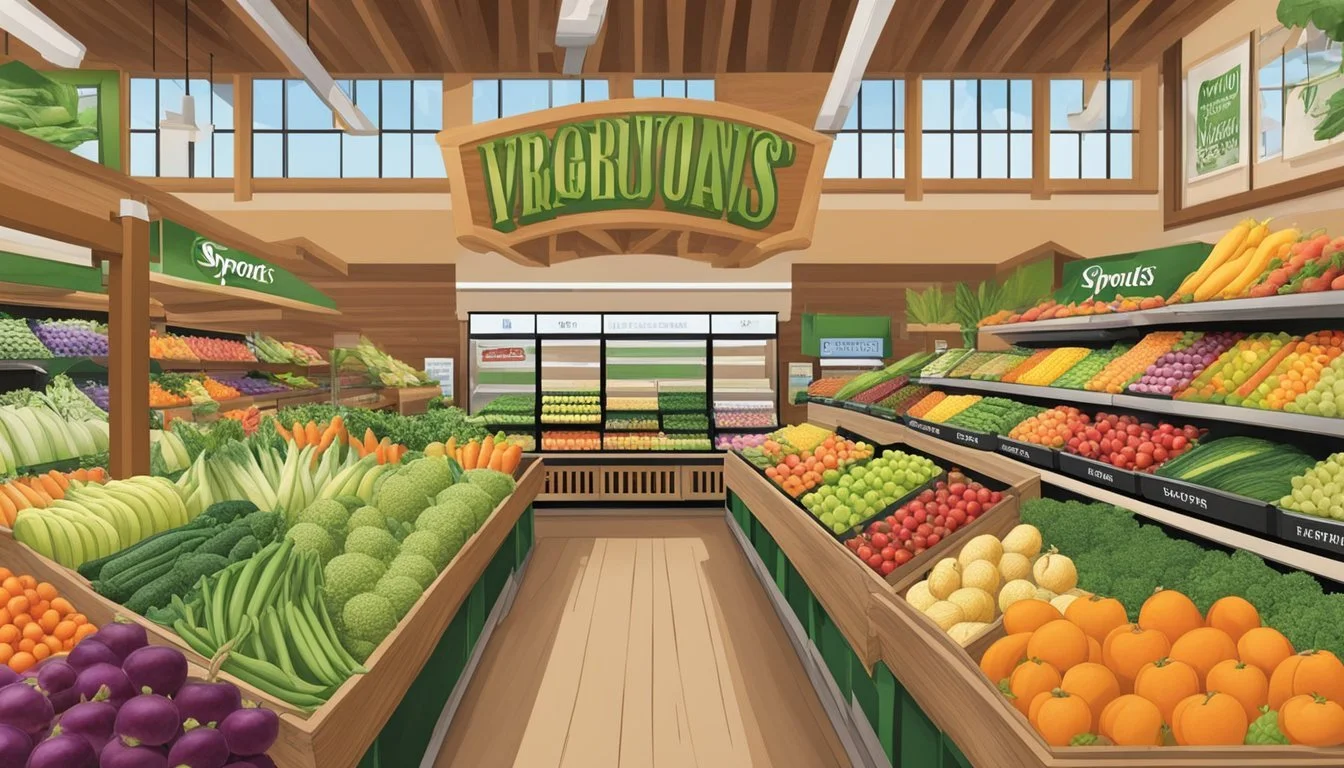Sprouts vs Wegmans
A Comprehensive Comparison of Quality and Value
Choosing the right grocery store can significantly impact your shopping experience and budget. Sprouts and Wegmans are two popular chains that offer distinct advantages for consumers. While Sprouts focuses on natural and organic products, Wegmans is known for its wide selection and customer service.
Wegmans typically offers lower prices overall compared to Sprouts, especially on dairy alternatives and name-brand products. However, Sprouts may have better deals on produce and meat. Both stores prioritize quality, but Whole Foods' acquisition by Amazon has shifted the pricing landscape, making comparisons more complex.
Customer preferences play a crucial role in determining which store is better. Wegmans consistently ranks high in customer satisfaction surveys, recently placing second in Newsweek's list of America's favorite grocery stores. Sprouts, while not as highly ranked, maintains a loyal following among health-conscious shoppers seeking natural and organic options.
Company Overview
Sprouts Farmers Market and Wegmans are two prominent grocery chains with distinct histories and approaches to retail. Both companies have grown significantly over the years, establishing themselves as popular shopping destinations for health-conscious consumers and those seeking quality products.
History of Sprouts Farmers Market
Sprouts Farmers Market began in 2002 in Chandler, Arizona. Founded by the Boney family, who had extensive experience in the natural foods industry, Sprouts quickly gained popularity for its focus on fresh produce and natural products.
The company expanded rapidly, opening stores across the southwestern United States. In 2011, Sprouts merged with Henry's Farmers Market, further increasing its presence in California and Texas.
By 2013, Sprouts had become a publicly traded company on the NASDAQ. Today, Sprouts operates over 370 stores in 23 states, offering a wide range of organic and natural products, with an emphasis on fresh produce, bulk foods, and vitamins.
History of Wegmans
Wegmans Food Markets has a much longer history, dating back to 1916 when John and Walter Wegman opened their first grocery store in Rochester, New York. The company remained family-owned and gradually expanded throughout the northeastern United States.
Wegmans gained recognition for its innovative approach to grocery retail. In the 1930s, it introduced refrigerated display windows and vaporized water sprays to keep produce fresh.
The company continued to grow and innovate over the decades. By the 1990s, Wegmans had become known for its large stores, extensive product selection, and focus on customer service.
Today, Wegmans operates over 100 stores across seven states. The company is renowned for its employee-friendly policies and consistently ranks high in customer satisfaction surveys.
Store Offerings
Sprouts and Wegmans differ significantly in their product selections and store offerings. Each retailer caters to distinct customer preferences, offering unique shopping experiences.
Product Selection and Variety
Wegmans boasts an extensive product range, featuring over 70,000 items. Their stores typically span 80,000 to 140,000 square feet, allowing for a wide variety of choices. Customers can find everything from everyday essentials to gourmet and international foods.
Sprouts, in contrast, operates smaller stores averaging 30,000 square feet. They focus on natural and organic products, offering around 19,000 items. While more limited in overall selection, Sprouts emphasizes fresh, healthy options.
Both stores provide a mix of national brands and private labels. Wegmans is known for its extensive selection of specialty and ethnic foods, while Sprouts concentrates on health-focused and alternative dietary products.
Quality and Freshness of Produce
Produce quality is a priority for both retailers. Wegmans sources fruits and vegetables from local farms when possible, ensuring freshness. Their produce departments are expansive, offering a wide variety of conventional and organic options.
Sprouts places significant emphasis on its produce section, which often occupies up to a quarter of the store space. They pride themselves on offering a diverse selection of seasonal and locally-sourced fruits and vegetables.
Both stores have rigorous quality control measures. Wegmans employs produce specialists to maintain freshness, while Sprouts' smaller store format allows for more frequent restocking.
Organic and Natural Foods
Sprouts specializes in organic and natural foods, with these products forming the core of their offering. A large portion of their inventory is dedicated to organic produce, meats, dairy, and packaged goods.
Wegmans also has a strong presence in the organic market. They offer an extensive selection of organic products across various departments, including their own Organic line.
Both retailers provide ample choices for customers seeking non-GMO, gluten-free, and other specialty diet options. Sprouts tends to have a higher concentration of these products, while Wegmans integrates them into their broader selection.
Prepared Foods and Bakery
Wegmans excels in prepared foods and bakery offerings. Their stores often feature multiple in-house restaurants, extensive hot and cold food bars, and made-to-order stations. The bakery department offers a wide range of artisanal breads, pastries, and custom cakes.
Sprouts' prepared foods section is more modest but still substantial. They focus on healthier options, including salad bars, freshly prepared meals, and grab-and-go items. Their bakery emphasizes whole grain and gluten-free options.
Both stores prioritize freshness in their prepared foods, with items made daily on-site. Wegmans offers more variety and customization, while Sprouts concentrates on health-conscious choices.
Exclusive Brands and Labels
Wegmans has developed a strong private label program, with over 4,000 Wegmans brand products across various categories. These items often provide quality comparable to national brands at lower prices.
Sprouts offers its own line of private label products, focusing on natural and organic options. While their selection is smaller than Wegmans, it covers key categories like vitamins, body care, and pantry staples.
Both retailers use their private labels to offer unique products and value to customers. Wegmans' brand spans a wider range of categories, while Sprouts' emphasizes natural and organic certifications.
Pricing and Affordability
Pricing plays a crucial role in choosing between Sprouts and Wegmans. Both stores offer different pricing strategies, deals, and loyalty programs that can impact overall affordability for shoppers.
Comparison of Everyday Prices
Sprouts and Wegmans have distinct pricing approaches. Sprouts emphasizes competitive prices on fresh produce and organic items. Their fruit and vegetable selection often features lower prices compared to conventional supermarkets.
Wegmans, known for its extensive product range, offers competitive prices on many staple items. Their store-brand products provide affordable alternatives to name brands without sacrificing quality.
Recent comparisons show Wegmans has a slight edge in overall affordability. A typical grocery basket at Wegmans may cost 1-3% less than at Sprouts, though this can vary by location and specific products purchased.
Deals and Discounts
Both stores offer weekly deals and discounts to attract budget-conscious shoppers. Sprouts runs "Double Ad Wednesdays" where the previous week's deals overlap with new promotions, creating extra savings opportunities.
Wegmans features "Consistent Low Prices" on everyday items. They also offer digital coupons and a rotating selection of "Price Lock" items, maintaining stable prices on select products for extended periods.
Seasonal sales are common at both stores. Sprouts often provides deeper discounts on produce during peak seasons. Wegmans typically offers more extensive storewide sales during holidays.
Membership and Loyalty Programs
Sprouts and Wegmans both offer free loyalty programs to enhance customer savings. The Sprouts app provides digital coupons, personalized deals, and cash-back offers on select purchases.
Wegmans' Shoppers Club card grants access to digital coupons and exclusive member pricing on certain items. Members also receive personalized offers based on shopping habits.
Neither store charges for their loyalty programs. Wegmans' program integrates seamlessly with online ordering and delivery services, potentially offering additional convenience and savings for frequent shoppers.
Shopping Experience
Sprouts and Wegmans offer distinct shopping experiences tailored to different customer preferences. Both stores emphasize quality products and customer satisfaction, but their approaches vary in several key areas.
Store Layout and Design
Sprouts features an open-market layout reminiscent of old-world farmers markets. The produce section takes center stage, occupying a large portion of the store. Aisles are wide and well-lit, creating a spacious feel.
Wegmans adopts a more traditional supermarket layout with a modern twist. The store is organized into themed sections, such as a dedicated cheese shop and a bakery that resembles a European patisserie. High ceilings and warm lighting contribute to an upscale atmosphere.
Both stores use clear signage and logical product placement to enhance navigation.
Convenience and Accessibility
Sprouts typically operates smaller stores, making them easier to navigate quickly. Most locations offer ample parking and are situated in easily accessible areas.
Wegmans stores are generally larger, providing a one-stop shopping experience. They often feature in-store dining options and specialty departments. Many Wegmans locations are open 24 hours, catering to various schedules.
Both chains have expanded their online ordering and curbside pickup services, adapting to changing consumer needs.
Customer Service and Support
Sprouts emphasizes friendly, knowledgeable staff who can assist with product information and dietary needs. Checkout lines are usually short, with efficient service.
Wegmans is renowned for its exceptional customer service. Employees undergo extensive training and are encouraged to build relationships with regular customers. The store offers free samples and cooking demonstrations to enhance the shopping experience.
Both chains prioritize customer feedback and have robust support systems in place for addressing concerns.
Digital and In-Store Integration
Sprouts offers a mobile app for digital coupons, weekly ads, and shopping list creation. In-store kiosks provide product information and recipes.
Wegmans leads in digital integration with its comprehensive app. Features include store mapping, product locator, and scan-and-go checkout. Digital price tags in stores ensure accurate pricing and reduce paper waste.
Both chains maintain active social media presences, sharing recipes, product highlights, and responding to customer inquiries. They also use data analytics to personalize offers and improve inventory management.
Health and Sustainability
Sprouts and Wegmans prioritize health-conscious and sustainable offerings. Both stores emphasize organic products, animal welfare, and environmental initiatives, but their approaches and focuses differ.
Organic and Non-GMO Offerings
Sprouts Farmers Market excels in organic and natural foods, with a wide selection of fresh produce, bulk items, and packaged goods. They offer over 7,500 organic products, comprising about 20% of their total inventory. Wegmans also embraces organic options, but their selection is more limited compared to Sprouts.
Both stores carry non-GMO products, but Sprouts takes it a step further by prominently labeling these items throughout the store. Wegmans offers non-GMO choices in their organic section and private label products.
Sprouts' commitment to natural and organic foods extends to their in-house brands, which are free from artificial colors, flavors, and preservatives.
Animal Welfare and Meat Quality
Wegmans and Sprouts both prioritize animal welfare in their meat departments. Wegmans partners with local farmers and adheres to strict animal care standards. They offer grass-fed beef, free-range chicken, and sustainably sourced seafood.
Sprouts focuses on antibiotic-free and hormone-free meats. They carry a variety of organic and natural meat options, including grass-fed beef and free-range poultry.
Both stores provide transparency about their meat sourcing practices, allowing customers to make informed choices about the products they purchase.
Environmental Initiatives and Packaging
Wegmans has implemented several environmental initiatives, including energy-efficient store designs and a commitment to reducing food waste. They've partnered with local food banks to donate unsold, edible food and compost inedible food waste.
Sprouts emphasizes reducing plastic waste by offering reusable bags and encouraging customers to bring their own containers for bulk items. They've also implemented recycling programs for plastic bags and packaging.
Both stores are working to reduce their carbon footprint through more sustainable packaging choices. Wegmans has pledged to make their private label packaging recyclable, reusable, or compostable by 2024.
Reputation and Brand Perception
Wegmans and Sprouts have cultivated distinct brand identities in the competitive grocery market. Consumer perception and industry recognition play crucial roles in shaping their reputations.
Customer Reviews and Ratings
Wegmans consistently receives high praise from shoppers. The grocery chain ranks #2 in the Harris Poll Reputation Quotient Rankings, just behind Amazon. This demonstrates strong customer satisfaction and loyalty.
Wegmans' fans cite several reasons for their devotion. These include excellent customer service, extensive product selection, and an enjoyable shopping experience. The store's layout and ambiance contribute to its positive reputation.
Sprouts, while less prominent, maintains a loyal customer base. Shoppers appreciate its focus on natural and organic products. The store's produce section and bulk foods department receive particular acclaim.
Market Presence and Recognition
Wegmans has established a strong presence in the northeastern United States. The company's long history, dating back to 1916, has helped solidify its brand recognition. Industry publications and consumer groups frequently recognize Wegmans for its quality and service.
Sprouts has experienced rapid growth since its founding in 2002. The chain has expanded its footprint across the southern and western United States. Sprouts' emphasis on healthy living and affordable organic options has resonated with health-conscious consumers.
Both stores have garnered attention from major media outlets. Business Insider and CNBC have featured stories on Wegmans' cult-like following. Consumer Reports regularly includes both chains in its supermarket rankings.
Concluding Analysis
Sprouts and Wegmans each offer unique strengths to shoppers. Sprouts excels in providing fresh produce, organic options, and health-focused products at competitive prices. The store's layout and atmosphere cater to health-conscious consumers seeking natural and specialty items.
Wegmans, on the other hand, boasts a wider product range and larger store formats. Its extensive selection includes gourmet foods, prepared meals, and household essentials. Wegmans' commitment to customer service and in-store dining options creates a more comprehensive shopping experience.
Price comparisons between the two stores can vary by location and product category. While Sprouts may offer better deals on produce and organic items, Wegmans' private label products and bulk options can provide value for shoppers.
Store accessibility differs, with Sprouts having a larger number of locations across the United States. Wegmans maintains a strong presence in the Northeast but has fewer stores overall.
Both retailers prioritize quality and customer satisfaction, making the choice between them largely dependent on individual preferences and needs. Sprouts appeals to those focused on natural and organic products, while Wegmans attracts shoppers seeking variety and a one-stop shopping destination.
Ultimately, the better store depends on factors such as location, budget, dietary requirements, and shopping habits. Many consumers may find value in incorporating both retailers into their grocery routines to maximize benefits and selection.






